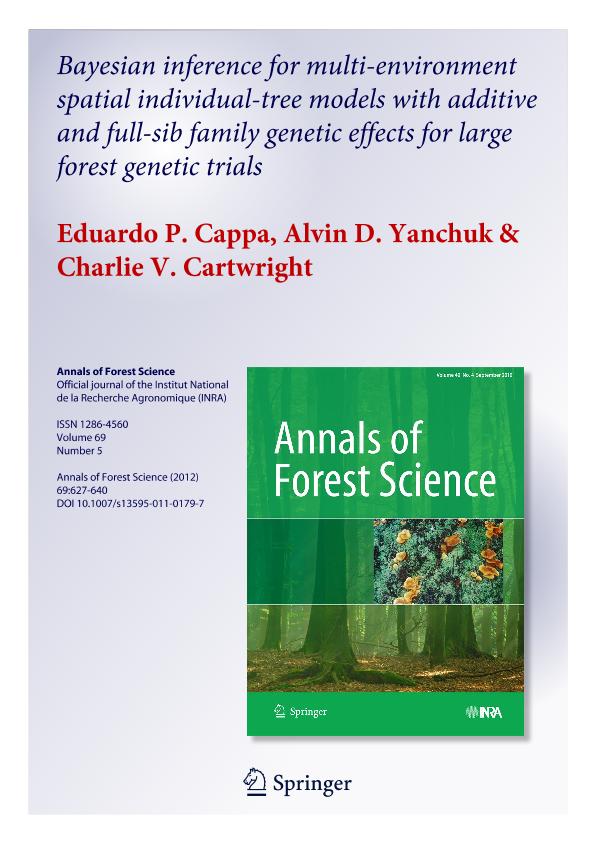Mostrar el registro sencillo del ítem
dc.contributor.author
Cappa, Eduardo Pablo

dc.contributor.author
Yanchuk, Alvin D.
dc.contributor.author
Cartwright, Charlie V.
dc.date.available
2023-05-02T17:31:17Z
dc.date.issued
2012-07
dc.identifier.citation
Cappa, Eduardo Pablo; Yanchuk, Alvin D.; Cartwright, Charlie V.; Bayesian inference for multi-environment spatial individual-tree models with additive and full-sib family genetic effects for large forest genetic trials; EDP Sciences; Annals of Forest Science; 69; 5; 7-2012; 627-640
dc.identifier.issn
1286-4560
dc.identifier.uri
http://hdl.handle.net/11336/196030
dc.description.abstract
Context: The gain in accuracy of breeding values with the use of single trial spatial analysis is well known in forestry. However, spatial analyses methodology for single forest genetic trials must be adapted for use with combined analyses of forest genetic trials across sites. Aims: This paper extends a methodology for spatial analysis of single forest genetic trial to a multi-environment trial (MET) setting. Methods: A two-stage spatial MET approach using an individual-tree model with additive and full-sib family genetic effects was developed. Dispersion parameters were estimated using Bayesian techniques via Gibbs sampling. The procedure is illustrated using height growth data at age 10 from eight large Tsuga heterophylla (Raf.) Sarg. second-generation full-sib progeny trials from two series established across seven sites in British Columbia (Canada) and on one in Washington (USA). Results: The proposed multi-environment spatial mixed model displayed a consistent reduction of the posterior mean and an increase in the precision of error variances than the model with Sets in Replicates or incomplete block alpha designs. Also, the multi-environment spatial model provided an average increase in the posterior means of the narrow- and broad-sense individual-tree heritabilities (h2N and h2B, respectively). No consistent changes were observed in the posterior means of additive genetic correlations (rAjj'). Conclusion: Although computationally demanding, all dispersion parameters were successfully estimated from the proposed multi-environment spatial individual-tree model using Bayesian techniques via Gibbs sampling. The proposed two-stage spatial MET approach produced better results than the commonly used non-spatial MET analysis.
dc.format
application/pdf
dc.language.iso
eng
dc.publisher
EDP Sciences

dc.rights
info:eu-repo/semantics/openAccess
dc.rights.uri
https://creativecommons.org/licenses/by-nc-sa/2.5/ar/
dc.subject
ADDITIVE GENETIC CORRELATIONS
dc.subject
FULL-SIB FAMILY GENETIC EFFECTS
dc.subject
GIBBS SAMPLING
dc.subject
MODEL COMPARISON
dc.subject
MULTI-ENVIRONMENT SPATIAL MODEL
dc.subject
WESTERN HEMLOCK
dc.subject.classification
Otras Ciencias Agrícolas

dc.subject.classification
Otras Ciencias Agrícolas

dc.subject.classification
CIENCIAS AGRÍCOLAS

dc.title
Bayesian inference for multi-environment spatial individual-tree models with additive and full-sib family genetic effects for large forest genetic trials
dc.type
info:eu-repo/semantics/article
dc.type
info:ar-repo/semantics/artículo
dc.type
info:eu-repo/semantics/publishedVersion
dc.date.updated
2023-04-28T10:44:22Z
dc.journal.volume
69
dc.journal.number
5
dc.journal.pagination
627-640
dc.journal.pais
Francia

dc.journal.ciudad
Paris
dc.description.fil
Fil: Cappa, Eduardo Pablo. Instituto Nacional de Tecnología Agropecuaria. Centro de Investigación de Recursos Naturales; Argentina. Consejo Nacional de Investigaciones Científicas y Técnicas; Argentina
dc.description.fil
Fil: Yanchuk, Alvin D.. British Columbia Forest Service; Canadá
dc.description.fil
Fil: Cartwright, Charlie V.. British Columbia Forest Service; Canadá
dc.journal.title
Annals of Forest Science

dc.relation.alternativeid
info:eu-repo/semantics/altIdentifier/url/https://link.springer.com/article/10.1007/s13595-011-0179-7
dc.relation.alternativeid
info:eu-repo/semantics/altIdentifier/doi/http://dx.doi.org/10.1007/s13595-011-0179-7
Archivos asociados
